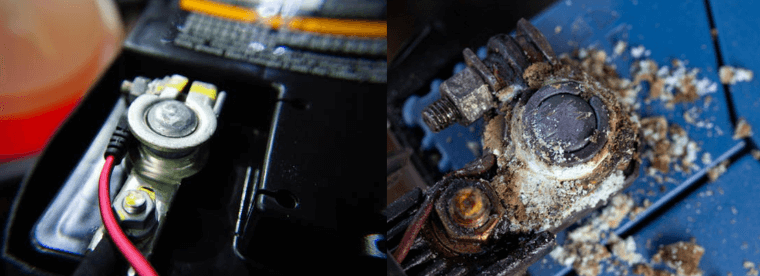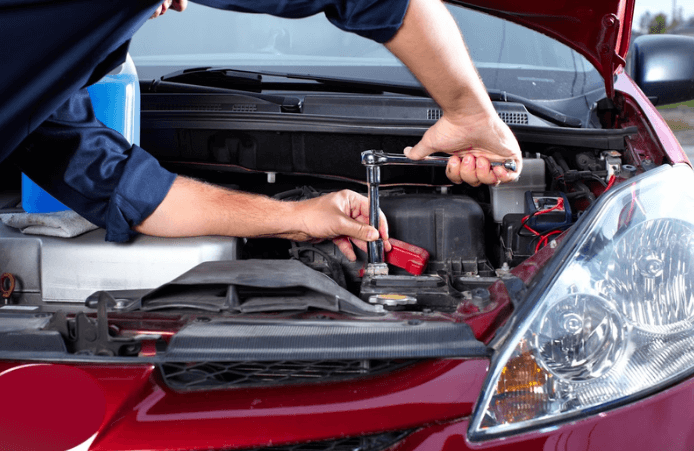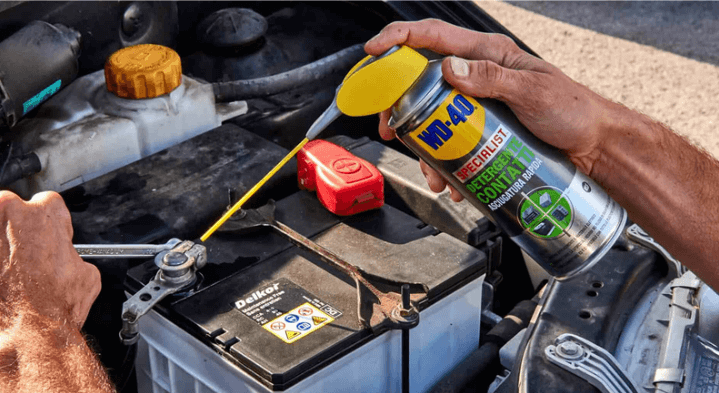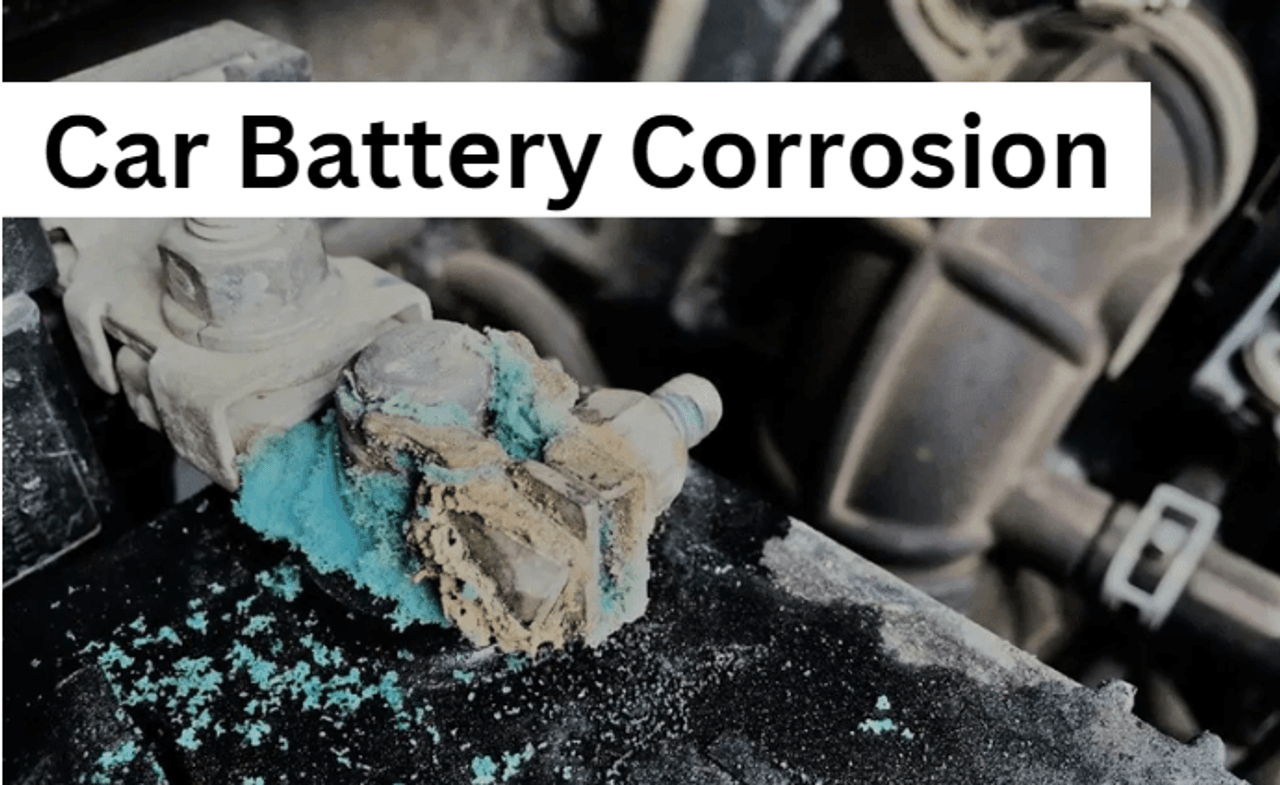Car Battery Corrosion: How to Clean a Corroded Car Battery
Have you noticed a powdery substance forming on the terminals of the car battery? The residue, which is corrosion, is usually whitish, gray, or blueish. Car battery corrosion is normal due to ordinary wear and tear.
Although the battery corrosion is rather expected, do not ignore it. Corrosion build-up can result in permanent battery damage, increased circuit resistance, and the car's electrical system damage.
You must understand how battery corrosion is formed, how to clean car battery corrosion, and preventative measures. Keep reading!
Car Battery Corrosion: What Is It and What Causes It?
Corrosion consists of a whitish, grayish, or blueish ashy or powdery substance forming around the battery terminals, posts, and cables. In some severe cases of corrosion, the residue can spill out of the hood of the car.
It is normal for batteries to release small amounts of sulfuric acid. When this happens, the sulfuric acid spills over the metal terminals and reacts with oxygen and atmospheric moisture to form the corrosion residue.
What Causes Car Battery Corrosion?

Several factors cause car battery corrosion. The most common cause is the chemical reaction between hydrogen gas, oxygen, and metal. Additional factors include:
- Age of the Battery- The lifespan of a battery is roughly three to five years. The battery becomes more susceptible to corrosion as it ages. Therefore, you must replace it after every three to five years.
- Fluid Leaks- Cracks or damages on the battery casing can cause fluid leaks. Battery acid leaks cause corrosion around the terminals and other components.
- Overheating- Overcharging the battery causes overheating, thus making it expand. As the battery expands, the liquid may spill thus making the terminals more vulnerable to corrosion. Car battery corrosion is more common during hot seasons or summer.
- Adding Excess Distilled Water- If you over-refill distilled water into the battery, it may cause water acid solution to spill out of the battery. The leakage may come into contact with the terminals and cables resulting in corrosion.
- Battery Type- Some batteries have tiny vents to let out excess sulfuric gas. If the vents are close to the terminals, it can cause corrosion.
How to Remove Battery Corrosion?

Do not ignore corrosion on your battery terminals. You must act to remove battery corrosionimmediately. It is easy to clean it yourself. But still, you can hire a professional to help you clean it.
Learn how to clean off battery corrosion at home by following these simple steps.
First, have all the cleaning supplies ready. Some of the items you need to successfully remove battery corrosion are:
- Cleaning solutions such as baking soda or specialized battery cleaning agent
- A stainless-steel wire brush, a battery brush, or an old toothbrush
- Clean water
- A Micro-fiber cloth or cleaning rags
- Pliers or a shifting spanner
- A wrench
- Heavy duty gloves
- Petroleum jelly
Here’s the procedure on how to clean car battery corrosion.
Step 1: Turn off the car before you start the process.
Step 2: Ensure your safety first. The corrosion residue on the terminals is acidic and is damaging to your skin and eyes. Wear protective heavy-duty hand gloves and safety glasses. Rinse off your skin immediately if you accidentally touch the battery fluid or the corrosive residue.
Step 3: Remove the cables. Before you disconnect the battery, save the stored data on the battery memory saver to protect the electrical system of your car. Refer to the car manual for a detailed guide on how to save information on battery savers.
Disconnect the negative terminal first and release the cable from the battery. Remember to keep the cable away from the terminal. Proceed to detach the positive terminal.
Step 4: Closely examine the cables. Inspect the cables carefully and confirm none is damaged. If you notice cracking, fraying, or corrosion on any cable, change it.
Step 5: Remove the battery. Lift the battery from the car. You can start cleaning off the corrosion residue from the battery. Use a pan to collect the corrosive residue for easy and safe disposal.
Spray the cleaning solution on the terminals to loosen off the dirt. Use the brush to scrub the terminals. Use clean water to rinse off the terminals and the cleaning solution. Finally, wipe it off with a cloth or a towel. Ensure it is completely dry.
Also, remember to clean up the terminal ends that connect to the cables.
Step 6: Reconnect the battery. After cleaning, place the battery back into the car. Reconnect the terminals. Start by carefully attaching the positive terminal to its cable, followed by the negative terminal.
That’s how to clean battery corrosion safely and successfully. You can start the car to test if the battery is working well.
How to Protect Your Car Battery from Corrosion?

Corrosion and the aging of your car battery is normal and unavoidable. But you can slow down or avoid battery corrosion. Some of the tips to help you reduce or prevent the corrosion of your battery are:
- Use Anti-corrosion Spray
Anti-corrosion spray coats the terminals to neutralize the salts and acids. Alternatively, use a commercial battery terminal protector to cover the terminals. The protector absorbs moisture around the battery. Also, it prevents the acid from touching the terminals.
If you cannot access the battery terminal protector, you can use petroleum jelly to apply it on the terminals to prevent any contact with sulfuric acid. - Do Not Overcharge
If there is a higher amount of corrosion residue on the positive terminal than on the negative terminal, the car battery is overcharging. Therefore, ensure the voltage regulator is performing optimally to control overcharging. - Avoid Undercharging
Corrosion on the negative terminal indicates that the battery is undercharging. Short drives or high-power demands by the car’s electronic system can cause undercharging or battery charge insufficiency. - Avoid Instant Accelerating or Stopping
Instant stops and acceleration can cause speedy corrosion of the battery terminals. - Regular Maintenance
Check your battery often to identify corrosion as it builds up and any electrical faults. Regular inspections and cleaning of the battery will keep it in good working condition for a long time. - Replace the Battery
If your battery is more than three years old and experiencing higher levels of corrosion than usual, consider replacing it.
Signs of Battery Corrosions
Obvious signs of corrosion in your battery include the existence of whitish, grayish, or bluish residue on one or both terminals. Other signs that your battery is corroded and requires cleaning or replacement are:
Trouble Starting your Car
If your car starts and dies almost immediately, your battery could be having low voltage. This is a sign that your battery is either dying due to old age and needs replacement, or the terminals are clogged with corrosion and needs cleaning.
Dimming Headlights
Due to a bad battery, your car might start experiencing electrical issues, causing the headlights to lose brightness or flicker.
Car Stalling While Driving
As the car battery dies, it causes interruptions to the signals it transmits to the ECU (Electronic Control Unit). With little energy in the battery, the car might muster power to start, however, as you are driving, the sensors that control the engine, speed, and fuel may lose signal causing the car to stop immediately.
The Ignition Clicking, But Not Starting
If you're experiencing ignition clicks in your car, the battery may be dying. The battery charges the starter for cranking the engine. If the energy from the battery is insufficient, it causes the clicking when you start the car. Also, it slows the cranking of the engine.
The Engine Lights Come On
If your car’s engine light flashes, it is a sign of a severe problem or a battery issue. Have a professional diagnose the problem.
Unpleasant Smell from the Hood
The smell of sulfur leaking from your car battery might cause a rotten eggs smell. Normally, a healthy battery does not smell. Therefore, this is a warning that your battery will die soon and it is already causing damage to other parts of the car. This calls for immediate replacement of the battery.
Additionally, different colors of the corrosion build-up on the battery may indicate various causes of corrosion. For instance:
- Greenish Buildup- This happens due to oxidation on the copper cable of the battery.
- Bluish Buildup- It indicates copper sulfate, which occurs when the copper terminal clamps come into contact with hot sulfuric acid.
- Whitish or grayish Buildup- It happens when the battery is leaking a lot of electrolytes due to damage or cracks on the casing.
Conclusion
Car battery corrosion is a common process and it should not alarm you. Although it is normal, car corrosion if neglected can cut short the lifespan of the battery and affect its performance. Additionally, the buildup of corrosion residue on the terminals prevents the smooth flow of electricity to the car's electrical system.
To prevent premature damage to the battery, ensure proper and regular cleaning of the battery. Also, observe preventative measures to reduce corrosion. Learn how to clean off battery corrosion step-by-step to keep your battery youthful longer.
FAQs
1. What is causing corrosion to my car battery terminals?
Corrosion on the terminals happens when sulfuric acid or the electrolyte leaks and touches the metallic terminals. The interaction between sulfuric acid, metal, and oxygen causes corrosion.
2. How often do I need to check if my battery is corroded?
Inspect your car battery every two to four months. If you live in humid or hot climates, you can check every one or two months.
3. When can I replace my car battery due to corrosion?
Learn to differentiate between normal corrosion and extreme battery corrosion. Some of the indications that you need to replace the car battery include dimming headlights, electrical issues, and problems starting the car.
Also, if the battery is over three years old and severely damaged by corrosion, consider buying a new one.










